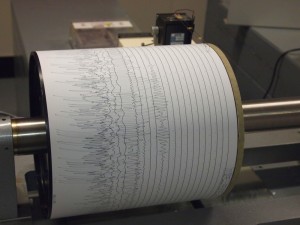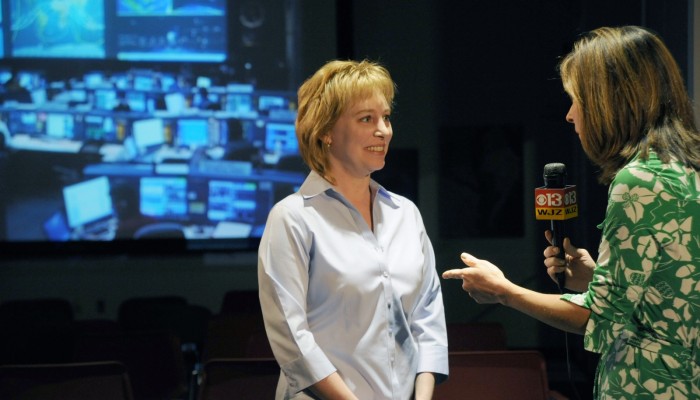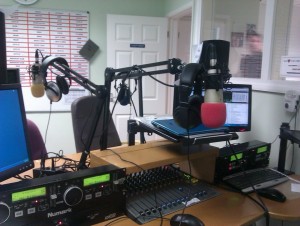At the beginning of the year, the small village of Rutland, in the heart of the UK, was hit by a 3.8 Magnitude earthquake. The quake didn’t cause any significant damage or injuries, but hit the headlines as seismic activity is a bit of a novelty in the UK!
In the wake of the quake, the UK press and media picked up the story and sought the opinions of experts to take part in interviews and give their views on the ground motions. Amongst those approached was my colleague and friend, Steve Hicks, a final year seismology PhD student, at Liverpool University. Steve took part in a BBC children’s TV programme called Newsround. On hearing of his TV appearance, I asked Steve to write a guest post for Jenga; I thought his personal account of his experience with the might be useful for other researchers too. Steve gives a brief account of his TV experience before listing his top 10 tips for talking to the media. You can watch Steve’s appearance on the children’s news programme here.
On Wednesday afternoon at 1.30 pm, our research lab in Liverpool received a call. The caller was a member from the production team of the BBC’s Newsround programme – a national news show aimed for children. They wanted someone from our research group to appear live on their afternoon bulletin at 4.20 pm to talk about a significant earthquake that had occurred the night before.
Our Prof. was tied up with meetings all day. No one else in the lab seemed particularly keen on the idea. I decided to go for it. And I’m so glad that I did.
Preparation was key
Although I didn’t know I was going to be appearing on TV, the preparation actually began the night before. A magnitude 3.8 earthquake struck England’s East Midlands region; it was felt by thousands of people. That night I kept myself updated – mainly via Twitter – with reports from the earthquake and what preliminary results were telling us about this seismic event.

A seismograph being recorded by a seismograph at Weston Observatory in Massachusetts, USA.
As part of an on-going outreach project that our research group is involved with, one of my roles is to produce informative PowerPoint slides about significant earthquakes in their immediate aftermath. These resources are aimed at educating schoolteachers, pupils and the general public to educate about earthquake science and their associated hazards. This outreach work meant that I was already fairly clued up about the earthquake, its context, and how to explain some complex scientific ideas to a non-specialist audience.
I had previously taken part in a practice radio interview at a public engagement course; this made me feel slightly more confident, but still, a live TV interview was a massive step up. I felt that with the TV show being tailored for children, if I messed up the interview, then I could maybe get away with not many people knowing about my cock-up!
My colleagues in the lab were awesomely supportive and very helpful. They offered to help me prepare and to get anything I needed to take with me.
Before I knew it, my transport had been organised by the BBC and I was about to arrive at the studio in Manchester.
A surreal experience
As I arrived, I was sat down with a cup of tea and got straight into a discussion with the production team about their proposed plan for my section of the show. Due to issues with booking my transport and the fluid nature of news that day, the production team were a little stressed – there were only 20 minutes left to prepare until we went live on air. I’m sure they are used to such last-minute stress, yet they were still hugely friendly and made me feel very relaxed. The team openly discussed with me the type of questions the presenter will plan to ask. They were even open to me changing the questioning slightly! This freedom made me feel much better and more in control. I knew what they were going to ask me and I could tailor a nice ‘model’ answer.
We went into the control room and I was fixed up with a microphone. Now I was starting to get nervous. However, I did get a view of the famous Blue Peter studio and managed to rub shoulders with some of its presenters! A big tick off the bucket list!

Screenshot of Steve’s appearance on the BBC children’s programme, Newsround.
The countdown starts … 5,4,3,2,1, … and the show is on air! In a flash, the show is over. Surprisingly, I wasn’t as nervous as I had expected. I have definitely been more nervous when giving conference talks. Maybe it had something to do with not having an audience in sight. There were only four crewmembers in the studio and talking with the presenter felt like a fairly regular conversation. I’m very glad I chose to bring a couple of props to explain the earthquake. I brought a seismometer and a trusty slinky, which were very popular with the production team and presenter.
I hate hearing my own voice so I haven’t yet watched the full video without the audio being muted!
My Top 10 Tips for Giving a Media Interview
- Get involved in outreach and public engagement projects
Getting accustomed to outreach work will you to get you used to telling stories about your field of research that can capture the imagination of a lay audience.
- Get involved with the conversation on social media.
Using Twitter and Facebook will help you to find out more about a topical subject and will give you an idea of what your fellow scientists in the community are saying about a newsworthy topic.
- Get on a public engagement short course.
Public engagement courses may be offered by a society or funding body in your field. Your PhD support funds may be able to pay for such a course. I attended the Natural Environment Research Council’s excellent public engagement training course. This was free and were able to carry out a valuable mock radio interview with an actual radio show presenter. Laura, do you know of any other media training courses here that you add here? Your University/Institution’s Press Office may also be able to provide some basic media training.
- Try to get a gig on local radio.
Speak to your University/Institution’s Press Office and say that you would like some media interview experience. Most local radio channels will love to hear about some ground-breaking research that is being done at their local university. This can be a great way to get some media experience without having to face a camera and a large audience. Try to persuade your Press Office to add you to their directory of experts, which media outlets often use to get people they want.
- Don’t rely on your undergraduate degree / PhD research alone to get you through the interview.
In all likelihood, your audience will not be interested in convoluted theories and innocuous scientific methods. The educational pages of a well-known institution in your research field that regularly communicates with the public and media can be priceless. I found the British Geological Survey and IRIS websites particularly helpful for ideas on answering frequently asked questions and for providing me with a few basic statistics that I could recite.
- Speak to your supervisor/boss before accepting any offer to give an interview.
Many outlets – depending on the programme and audience – may prefer to interview someone more youthful than an ancient Prof. It is also likely that your supervisor is an old hand at media interviews, but they may be too busy and might offer an interview to another member of the research group. If they have media experience, they may give you some valuable tips and will tell you whether or not they think you will cope with the interview.
- Props are priceless.
The production team are always keen to have a ‘hands on’ aspect during your piece, especially if the audience is quite young. A prop or two may also mean that you do not have to think on your feet for as much time.
- Be prepared for a last-minute call up.
Keep some key props in your lab that you can take to an interview. Your look: maybe keep a smart-ish shirt in your office in case you get an emergency call-up. But, you need not look too smart. I hadn’t shaved and my woollen jumper still had dog hairs on from my previous home visit! But nobody seemed to care or notice. They didn’t give me any make-up either!
- Be patient with the production team.
The show’s team have probably had just as much, if not more, of a stressful day as you. The show structure will constantly change as breaking news comes in. They have got to get guests in at very short notice. Making a live TV show is hard work! It is also possible that someone has asked you to appear on their show, but you get cancelled at the last minute; news programme schedules change fast, so this can happen often.
- Most importantly of all, go for it!
You’ll regret it if you don’t take the opportunity and it will any future decision a little bit harder. Body language is key – smile, keep your back straight and enjoy the moment!
By Steve Hicks, PhD student, University of Liverpool






